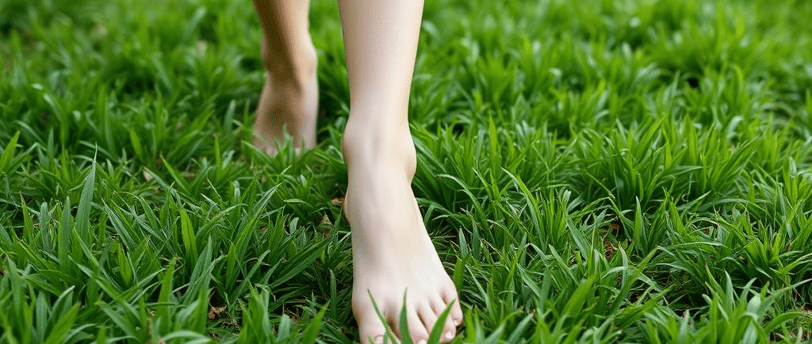Ground Yourself with Barefoot Walking: Connect with Nature and Recharge Your Energy
🧘WELLNESS TIPS✨SELF-CARE & LIFESTYLE HABITS


In today’s fast-paced world, we often find ourselves disconnected from the natural environment. Concrete jungles replace verdant landscapes, and the constant buzz of technology overshadows the soothing sounds of nature. This disconnection can lead to various mental and physical ailments, including stress, anxiety, and fatigue. However, an ancient practice that has been gaining popularity in recent years offers a simple yet profound remedy: barefoot walking, or grounding. This article will explore the benefits of this natural practice, how it connects us with the earth, and ways to incorporate it into our daily lives.
What is Grounding?
Grounding, also referred to as "earthing," involves being in direct physical contact with the earth's surface. This can include walking barefoot on grass, soil, sand, or even stones. The practice is based on the idea that the Earth's surface has an electric charge that can influence the human body positively. Scientific studies have begun to validate this belief, indicating that grounding can help reduce inflammation, improve sleep, alleviate pain, and promote a general sense of well-being.
The Science Behind Grounding
At the core of grounding is the principle that the Earth is rich in electrons. When we make physical contact with the ground, our bodies can absorb these electrons, which may help neutralize free radicals and reduce oxidative stress. Free radicals are unstable molecules that can contribute to a range of health issues, including inflammation, tissue damage, and chronic diseases.
Additionally, exposure to the Earth’s electric charge has been shown in studies to influence our circadian rhythms positively, aiding in better sleep quality. For instance, research published in the Journal of Alternative and Complementary Medicine has demonstrated that participants who regularly practiced grounding experienced improved sleep, reduced pain, and lower levels of stress hormones.
The Physical and Mental Benefits of Barefoot Walking
1. Physical Health Improvements
Barefoot walking allows you to engage with different terrains, which can enhance muscle strength and improve balance. When you walk without shoes, your foot muscles work harder, leading to stronger arches and more flexible joints. This activity encourages proper posture, which can alleviate lower back pain and other musculoskeletal issues.
Moreover, grounding is thought to reduce inflammation and promote healing. For those with chronic pain or conditions like arthritis, walking barefoot can often lead to relief and improved mobility.
2. Stress Relief and Mental Clarity
The hustle and bustle of modern life can lead to overwhelming stress and anxiety. Grounding provides a simple yet effective way to reconnect with oneself and find tranquility. Spending time in nature—especially in a bare-footed state—can help to lower cortisol levels, the hormone primarily responsible for stress responses.
Studies suggest that individuals who engage in grounding often report a reduction in anxiety and a clearer, more focused mind. The tactile sensations of grass, sand, or soil beneath your feet not only stimulate your nervous system but also encourage mindfulness. This mindfulness enables you to immerse yourself in the present moment, allowing for mental clarity and emotional release.
3. Enhanced Energy Levels
Do you ever feel drained after a long day? Grounding proponents argue that direct contact with the Earth can help recharge your energy levels. The absorption of electrons from the Earth may invigorate body systems, refreshing both body and mind. Many individuals report feeling a natural boost in energy after a session of barefoot walking, often describing it as a feeling of being rejuvenated and revitalized.
How to Start Grounding: Tips for Beginners
Embracing the practice of barefoot walking can be both liberating and rewarding. Here are some practical tips for getting started:
1. Choose the Right Location
Begin your journey into barefoot walking by selecting natural settings that resonate with you. Parks, beaches, open fields, and forest trails offer excellent opportunities to connect with the Earth. Pay attention to the type of surface; soft grass or sandy beaches can be more comfortable for beginners.
2. Start Slowly
If you're new to barefoot walking, it’s important to ease into the practice. Begin with short walks of about 10–15 minutes and gradually increase your time as your feet adapt. This allows your feet to strengthen and build calluses as needed.
3. Be Mindful of Your Surroundings
During your barefoot walk, focus on your surroundings. Feel the textures of the ground beneath you—the coolness of grass, the warmth of sand, or the firmness of soil. Listen to the sounds of nature and breathe in the fresh air. Engaging your senses will deepen your connection with the environment.
4. Incorporate Grounding into Your Routine
Make grounding a part of your weekly routine. Designate specific times for barefoot walks, whether it's a stroll in the park, a beach day, or even walking in your backyard. Consistency will increase the benefits you experience.
5. Combine with Mindfulness Practices
Consider pairing your barefoot walking with mindfulness or meditation practices. Focus on your breath while you walk, or use the experience as a form of moving meditation, paying attention to each step and the sensations that arise.
Conclusion: Reconnect to Recharge
In an era dominated by technology and urbanization, grounding offers a valuable reminder of our intrinsic connection to the natural world. Barefoot walking is more than just a method of transportation; it’s a pathway to improved health, emotional well-being, and a renewed sense of energy.
So, kick off your shoes, step outside, and experience the simplicity and joy of connecting with the earth beneath your feet. Reconnect to recharge—your mind, body, and spirit will thank you. As you indulge in the natural rhythms of the Earth, you may find that grounding becomes not just a practice but a cherished ritual in your life.
